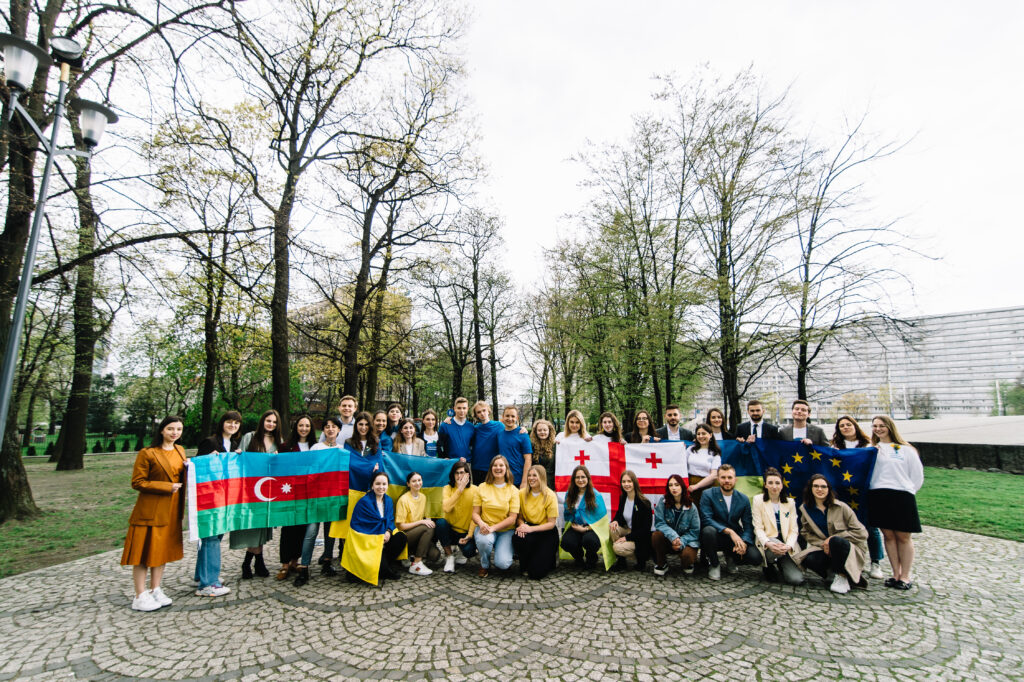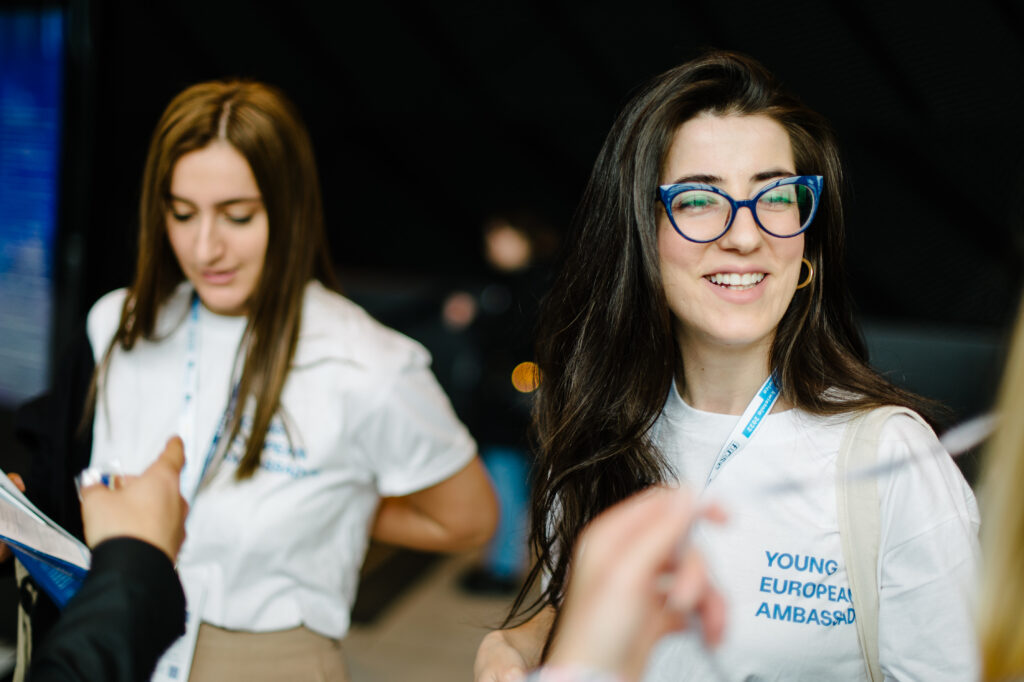
Blog: The European Forum of Young Leaders 2022. Why it is important to keep talking about Ukraine
On 25-27 April, a team of Young European Ambassadors took part in the European Forum of Young Leaders, which was part of the annual European Economic Congress. The forum, as well as the main event, took place in Katowice, Poland, and gathered participants from the European Union, Western Balkans, Eastern Europe, and the Caucasus to have a common reflection on today’s political changes, voice our opinion, enrich our expertise and establish new contacts.
I felt a great need to broaden my outlook on European values, establish new partnerships and clearly identify the most efficient instruments for implementing the pro-Western economic perspective of Ukraine, and this is why I decided to take part in the event. It totally lived up to my expectations and even exceeded them. In this blog, I would like to share some of my experiences, and say more about the need to highlight what is happening in my country, Ukraine, at such diplomatic, political, and economic events.
The European Forum of Young Leaders was full of discoveries and opportunities to practice the knowledge received. The most heartwarming thing for me was the constant focus on Ukraine during the forum’s sessions. It’s really important to actively stand for Ukraine right now as the war is no longer a political confrontation – it is decisive for the ideological future of European civilization. The informational front during the hybrid war has a crucial role for achieving a complex victory. The European Forum of Young Leaders contributed significantly to spreading the right view on the current situation. Among all the sessions, my favourite ones were ‘Europe and the world in 2030’ and ‘Global threats today: Security and the hybrid threat’. They answered many of the questions I’ve been asking over the past three months. For example, I was truly impressed by the words of Mikuláš Dzurinda, President of Wilfried Martens Centre for European Studies and Former Prime Minister of Slovakia during his speech on the “Europe and the world in 2030”. He described two scenarios of the European future: a positive and a negative one which are highly precise. The positive one consists of 10 points:
- In 2030, the EU will become stronger and larger. Some countries belonging to the Eastern Partnership and Western Balkans regions will enlarge the European Union.
- Ukraine will become an EU and NATO member.
- The EU will become a federalised grouping of countries with a common army, common defence, and a president who will be elected directly by the people.
- NATO will be a highly respected global security power that provides its members with the highest security standards.
- The world will overcome the COVID-19 pandemic successfully. This means we will stabilise not only our health security systems, but also our deficits and public finances.
- Russia without Putin will reject dictatorship and tyranny and will slowly move towards pluralism.
- China will become more cooperative and not so centrifugal and aggressive as the country is at present.
- Greenhouse gas emissions will fall significantly, and we will observe the elimination of global warming.
- The tension in the Middle East and poverty in Africa and other regions will be mitigated.
- Poland will win the World Cup.
This scenario is the one that gives hope and shapes the vision for a better future. However, if our actions aren’t immediate and efficient, we’ll face the opposite – 5 negative plots:
- The EU will fall apart.
- The world will be shaken by different conflicts.
- China will dominate the global economy with all the negative consequences of this reality.
- Immigration to Europe will exceed our absorption capacities.
- Global warming will continue with all relevant negative consequences.
These theses are reasonable enough for starting a relevant reflection on the future right now. I would also like to note the words of Maryna Popatenko, Deputy Minister of Youth and Sport of Ukraine: “European programmes need to be reviewed, their objectives and priorities have to correspond to the new geopolitical situation – there has to be a stronger accent on the promotion of common European values.” No doubt, common ideas of democracy and sustainability are one of the most distinguishing political characteristics of Europe. In order to save our ideological identity, we should unite around recurring issues, trying to solve them with bold, resolute, and effective efforts.
One of the key questions is: “What can young people do today to make Europe a better and safer place to live?”From this point, it appears crucial to provide the young generation with a qualitative education based on objectivity and general morals, and widen the range of their opportunities to participate in common political life and practise the idea of responsible citizenship.
Talking about the economic threats and losses caused by the Russian invasion of Ukrainian territories, it’s important to distinguish three main areas with the highest economic vulnerability to the effects of the war: energy, trade, and finance. Now, as was also mentioned during one of the discussions, energy is a hot topic for European countries as they’re eager to achieve energy independence and continue to move in the direction of ecological sustainability.
Last but not least of my highlights came during the session on hybrid war. We were discussing many aspects of this modern phenomenon, particularly, the methods of its implementation, how and who has been using it, its consequences, and perspectives on how to make citizens more resilient in the face of a hybrid threat. This issue was of special interest to me, as the hybrid war is now taking place in my country. As a Ukrainian, I witness its destructive power, which can blur minds and cause significant harm or even destroy legislative, social, and economic sectors. Thanks to the fruitful dialogue we had, I clearly understand what steps should be taken to prevent and reduce cases of such a war in the future. To be specific, we should reform the European security system, fight propagandist regimes by increasing the number of independent media sources and providing citizens with access to them, implement the concept of the rule of law, unite common efforts and act in advance to prevent the potential threat.
As I mentioned earlier, the European Forum of Young Leaders revolved around the current situation in Ukraine. It’s extremely important to keep the war in the public eye at least until it ends. Dozens of times I heard that what’s happening in my country is “unbelievable”. That’s true. Such atrocities were not expected by us who lived in the illusion of peace. However, we must accept it and pursue our European, democratic morals further, whatever price it may take. Sustainable informational support is an instrument for the fight against Russian propaganda. You can’t stay aside when your neighbours are dying every day. Ukraine needs your voice. And I’m hugely grateful to all the countries that have practically manifested their support to my country. Every step is more than precious for us. As Winston Churchillsaid, “History is written by the victors”. So, let’s shape the common European future as we’re stronger only together.


LATEST

How you can help the planet every day

Building Europe: Poland’s experience of joining the European Union and lessons for Ukraine

World Health Day 2024: My Health, My Right

EUREKA MEETS EUROPE – opportunities to develop and study. My experience

Can you wear pink in the workplace?
More campaign pages:
Interested in the latest news and opportunities?
This website is managed by the EU-funded Regional Communication Programme for the Eastern Neighbourhood ('EU NEIGHBOURS east’), which complements and supports the communication of the Delegations of the European Union in the Eastern partner countries, and works under the guidance of the European Commission’s Directorate-General for Neighbourhood Policy and Enlargement Negotiations, and the European External Action Service. EU NEIGHBOURS east is implemented by a GOPA PACE-led consortium. It is part of the larger Neighbourhood Communication Programme (2020-2024) for the EU's Eastern and Southern Neighbourhood, which also includes 'EU NEIGHBOURS south’ project that runs the EU Neighbours portal.

The information on this site is subject to a Disclaimer and Protection of personal data. © European Union,